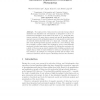Free Online Productivity Tools
i2Speak
i2Symbol
i2OCR
iTex2Img
iWeb2Print
iWeb2Shot
i2Type
iPdf2Split
iPdf2Merge
i2Bopomofo
i2Arabic
i2Style
i2Image
i2PDF
iLatex2Rtf
Sci2ools
134
click to vote
ICCBR
2005
Springer
2005
Springer
Knowledge Intensive Case Based Support for Automated Explanation of Biological Phenomena
The rapid growth of data stored in molecular biology-related databases has stimulated the development of integrative tools for retrieval and presentation of the data in the form of, e.g., biological association networks. We argue that a general and specific knowledge-based approach may provide substantial support for automated reconstruction of networks which otherwise tend to be large and, eventually, unreadable. This knowledge-based approach introduces a novel strategy with the potential to greatly enhance the explanatory power of automatically generated biological association networks. We discuss the motivation for a study of the process an expert employs while building a network, and suggest that a series of expert sessions be used as a case library for future reference. An example of a biological problem and the shape of its solution is described, and the types of knowledge involved are discussed.
Biological Association Networks | ICCBR 2005 | Knowledge-based Approach | Specific Knowledge-based Approach |
Related Content
| Added | 27 Jun 2010 |
| Updated | 27 Jun 2010 |
| Type | Conference |
| Year | 2005 |
| Where | ICCBR |
| Authors | Waclaw Kusnierczyk, Agnar Aamodt, Astrid Lægreid |
Comments (0)

